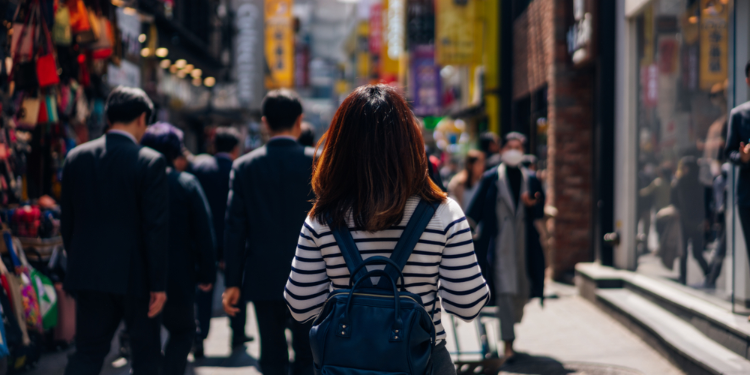
Anna has been living in South Korea for nine years and Laura left after a year of living in the same country. What is it about South Korea that makes a 19 year old want to leave everything behind for? And on the other hand, what is it about the country that makes someone else leave after a year? Anna and Laura tell us their stories.
Can you introduce yourselves to our readers?
Anna: My name is Anna, I am 28 years old, originally from a village in the province of Padua and I have lived in Seoul for 9 years. I currently work for a Korean company that imports Italian products and I manage the Persi youtube channel in Korea.
Laura: My name is Laura, I turned 29 in January and currently live in Bologna. Growing up I always had a strong interest in the east, between middle school and high school I spent a lot of my time reading manga and watching anime. Subsequently I became interested in South Korea, where I moved in 2013. Although initially the idea was to stay and live in Seoul, in November 2014 I made the decision to return to Italy.
Why did you move to South Korea?
Anna: In high school, following Japanese courses, I became very interested in the east and, in my fourth year of high school, I decided to spend a summer in Tokyo on a study holiday. It changed my life. In Japan I ironically met more Koreans than Japanese, and from there my interest in Asia turned to Korea. I came to Seoul immediately after graduation, initially with the intention of staying a year, but ended up studying at a Korean university and finally I found work here.
Laura: During the last year of high school, I set aside the money to go on a trip to Korea after graduation. I left alone and spent 2 months in Seoul, during which I had the opportunity to have a lot of new experiences, meet friends from all over the world, immerse myself in a culture different from mine and start to know a place that seemed perfect. During the next 3 years I couldn't think of anything else, I just wanted to go back to South Korea to get to know her better ... and so I actually did.
Did you have difficulties in adapting?
Anna: Although it has been nine years since I arrived, there are still some aspects of Korean culture that are difficult to digest, such as the competitive atmosphere that is always present: in work, in interpersonal relationships, at school. However, these are aspects that affect Koreans more strongly than foreigners.
Koreans are aware that, especially in the West, there is a much more liberal mentality and, therefore, do not expect the same behaviors from foreigners as they would expect from their peers. This is a positive aspect, because we are not forced to comply with all their social rules, but on the other side it shows that despite living in Korea for many years, you speaking perfect Korean and having a good understanding of Korean culture, you will always be considered "foreigner".
After 9 years I think I have adapted pretty well to Korean society, finding a balance that makes both Italian and Korean culture coexist.
Fortunately when I arrived in Korea I was only 19 years old, so all the life experiences that have shaped me so far I have mainly lived here. This certainly helped me adapt much faster.
Laura: Just because I returned to Italy after a year and a half, I can't say that I never managed to adapt. Most of the difficulties I had are related to the degree of stress that I felt for almost the entire period in which I lived in Seoul, due to my perception of the Korean way of life: live to work (and not to work to live, I find there is a subtle difference), the air of competitiveness that can be felt almost everywhere and the great consumerism. I still struggle to think that I can adapt to such a lifestyle.
What are the first things an expat must do when s/he moves to South Korea?
Perhaps the most important are:
- Make sure you have a visa for what you want to do;
- Make sure that your credit / prepaid card works (at least until you have the opportunity to open a Korean current account);
- Obtain the Alien Registration Card, or the identity card that is given to anyone who has to stay in South Korea for more than 90 days;
- Prepare at least 3000 euros for accommodation. In Korea, houses usually require a fairly high deposit, which usually starts at € 3,000 (the deposit is returned at the end of the contract).
What are the traditions of Korean culture that impressed and intrigued you the most?
Anna: One thing I really appreciate about Korea is respect. Formal language is also used with small children even and often with parents too. Returning to Italy I realized how many children do not respect parents and the elderly, responding badly without valid reasons. These are things that would be unacceptable in Korea. Respect is very important even with people who do not know each other, for this reason hardly anyone is seen, for example, to pass the queue and the crime rate is very low.
Laura: One of the aspects that I find most fascinating of Korean culture is the concept behind the word 우리 (uri), which has two meanings: "we" and "ours", it is the latter that I find particularly interesting, because in Korea used when talking about one's own things / people, but at the same time shared with others, for example: “우리 집” (uri jib) - our home, “우리 엄마” (uri omma) - our mom, “우리 나라 ”(Uri nara) - our country. South Korea is a country characterized by a strong group mentality, which is reflected in the way Koreans speak and behave about what is of the individual and what is shared with others.
Have you managed to integrate? Are Koreans open to foreigners?
Anna: Korea has been changing a lot in recent years and the perception of the "foreigner" is also changing. As soon as I arrived in Korea it was practically impossible to see foreigners on the street, and every time I went out I felt perpetually observed. They were not bad looks, but curious.
In the past 3-4 years, however, foreigners in Korea have increased exponentially and many programs are broadcast on TV with people from all over the world. This undoubtedly helped Korea to open up to other nationalities a lot. However, a few years have passed since this change started, so I cannot say that it is easy for foreigners to integrate 100% into a group of Koreans, but undoubtedly it is now much easier to find mentally open people.
Laura: Unfortunately the "briefness” of my experience in Korea has not given me much way to integrate, but apart from this I have always perceived Koreans (especially the younger ones) very open to foreigners and interested in discovering cultures other than their own.
Tell us a little about your blog.
Our blog is called Persi in Korea, it was born in 2013 from the intention of being able to give useful information on South Korea to all Italians who want to go there for vacation, study or work. Until 2013 it was really difficult to be able to find online travel tips in Italian, to the point that to obtain them it was easier to write on Facebook to people who already lived in Korea. So we decided to start a blog to make travel information and advice available to anyone who needed it. On our blog you can find articles on culture, language, food and places to visit and also more practical articles related to visas, university enrollment, telephony, etc. In short, we try to answer any doubts you may have about South Korea.
Together with the blog we also opened a Youtube channel, where we show life in Korea and the curiosities of this country.
You can find us on our website, youtube channel, Instagram and Facebook.
To live there, is it essential to speak Korean?
Living in Korea without speaking Korean is possible, however an excellent command of English is required. Obviously the importance of one or the other language is dictated above all by the needs of the case: some university courses can be attended with English only, with regards to work, things are quite variable: there are those who manage to find work with English, other jobs require excellent command of Korean. It all varies a lot depending on the field.
Obviously, in order to solve problems of any kind and to integrate better, we strongly recommend learning Korean.
We both first studied some Korean in Italy and once in Korea we attended a rather intensive language course, so as to have good foundations that would allow us to use the language daily.
What are the most common jobs that expats in South Korea do?
English native speakers are mainly teachers. In Korea there is a real obsession with learning English and there are language academies everywhere.
As for Italians, many work in catering and many others in import-export companies with connections with Italy.
How much does it cost you to live there a month? Is the cost of living higher than elsewhere?
Anna: Living in Seoul I spend 1,600 euros on average per month.
The cost of living is not too high when compared to other metropolises in the world. Vehicles, gasoline and food are cheaper than back home in Italy, what instead costs are mobile phone plans (at least 50 euros per month) and accommodation (which, however, if compared with other cities is not excessive).
What is the Coronavirus situation in South Korea now?
Anna: In Korea since February 2020, when there were the first cases, immediate measures were taken and immediately we started wearing masks and limit our movements. Certainly also for this reason the situation has always been under control.
The situation is fairly stable for now. There are no limitations for travel within the country, but there is an obligation to use the mask when entering closed places.
Korea has shown once again how innovative it can be. To enter certain places, such as Karaoke, you need to register your name, telephone number, body temperature, entry and exit. Initially it was done via excel file, now it is done via Kakao Talk (the Korean Whatsapp). Just open the personal QR code located inside the app and once scanned it immediately transfers all the data, speeding up registration and safeguarding the "Coronavirus" situation. In the event one of the people who has been in that room is diagnosed with Coronavirus all the people who have visited the room during that period are contacted and tests are performed.
Undoubtedly all these measures have been fundamental in keeping the situation under control.



















